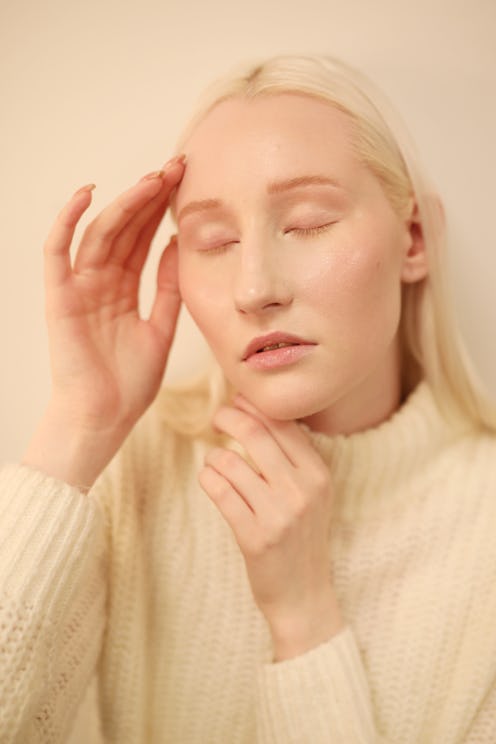(Beauty)
Do You Have Sensitized Skin? Here’s What Derms Say

Fun fact: I fight with beauty influencers on Instagram. I’m not proud of it, per se... but I do find joy in correcting skin misinformation (mis-skinformation?) when I see it. Since so many of my comment wars revolve around the same issue, I figured I should have a link handy — complete with dermatologist input — to passive-aggressively post the next time I bristle at a beauty guru’s caption. Here it goes: No, you don’t have sensitive skin, especially if you’re using high-dose retinoids and potent exfoliating acids on the regular. You have sensitized skin. The difference between sensitive and sensitized skin? The latter is a condition that seems like sensitivity, but differs in two major ways: you do it to yourself, and you can undo it to yourself.
“Some people do have a naturally sensitive skin type,” Dr. Loretta Ciraldo, M.D., F.A.A.D, the founder of Dr. Loretta Skincare, tells The Zoe Report. “These people are sensitive from childhood and need to avoid many ingredients, fabrics, and some foods that will make them breakout in a rash.” Textbook sensitivity is genetic, and those who have it are often prone to allergic reactions and inflammatory conditions, like rosacea. According to various reports and surveys, about 70 percent of the current population self-identifies as "sensitive-skinned," but back in the 1980s, that number was more like 30 percent. So what’s going on here — is skin collectively becoming more sensitive?
Not exactly, say derms. Due to increased environmental exposure (more pollution, less ozone protection) and over-the-top skincare routines (layers of alcohols, acids, retinoids, and more), skin is becoming more sensitized. “Sensitized skin happens after exposure to a potential irritants in someone who started out with normal, non-sensitive skin,” Dr. Loretta explains. The main tip-off that you’re dealing with sensitization is your age. “If you’re in your twenties when this starts, it’s almost definitely caused by a product or environmental exposures,” the derm says.
Here’s why most people get confused with the whole sensitive-versus-sensitized thing: All skin is reactive when exposed to irritating ingredients. That is, essentially, its job. Skin transforms into a range of colors and textures when met with a not-so-good-for-you substance — think: hives from poison ivy, swelling from a bee sting — as a way to get your attention and alert you to a problem. (Which, honestly, is pretty mind-blowing.) When you think about it that way, experiencing redness, stinging, breakouts, or a rash after using a particular product doesn’t point to an issue with your skin — it points to an issue with the product.
“Some ingredients will irritate or dry people with very ‘normal,’ healthy skin,” Dr. Loretta says. “These include sulfates in cleansers, benzoyl peroxide in acne products, and ethyl alcohol in serums.” All three are pretty standard ingredients; I guarantee you’ll find at least one lurking in your current skincare routine. “There is another group of ingredients that works by being slightly irritating,” the dermatologist continues. “These include acids — like glycolic acid — and retinoids, like trentinoin and retinol. Vitamin C (also known as L-Ascorbic acid) can also be potentially irritating if used every day.” She notes that it’s possible to use some of the ingredients in the latter category without issue, but it’s best to start slow and build up a tolerance to avoid irritation. “Silicones, essential oils, waxes, fragrances, and dyes in products can also be particularly sensitizing,” Dr. Lily Talakoub, M.D., F.A.A.D, a board-certified dermatologist with McLean Dermatology, adds in an email to TZR.
The reason many of the above ingredients can lead to sensitized skin — especially when used together — is because they degrade the skin’s barrier (the thin, protective layer designed to keep irritants and pathogens out and moisture in). Luckily, the solution is simple: Use fewer products, and give your barrier the chance to build itself back up.
Starting to suspect your skin is sensitized? To find out for sure, “it needs to be evaluated by process of elimination,” Dr. Talakoub says. “Start at home by eliminating any products with sulfates, ethyl alcohol, benzoyl peroxide, and anything that says ‘acid,’” Dr. Loretta advises. “Also read the ingredient listing for your newest products, and if there seem to be any potentially irritating ingredients, stop use immediately.” (She notes that a visible, persistent rash should be checked out by a dermatologist ASAP.)
As for what products won’t irritate your not-actually-sensitive-just-appopriately-reactive skin, that will differ from person to person. Gentle, clean ingredients with barrier-repairing properties — like probiotics, Omega fatty acids, and antioxidants — are usually a safe bet, though.
And, if after all that, you find you do have a textbook case of sensitivity? Check out my tried-and-true skincare regimen for sensitive skin.